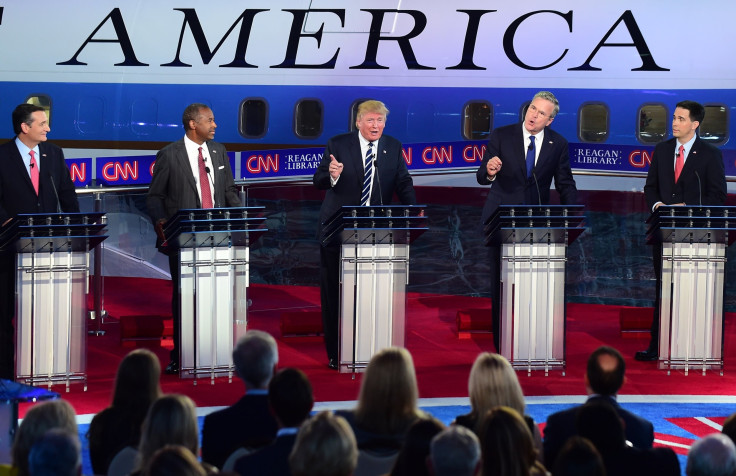Margaret Thatcher On $10 Bill? GOP Candidates Recommend Women To Replace Alexander Hamilton

The GOP debate moderators Wednesday tried to end the night on a light note, and in doing so they let the Republican candidates get creative. They asked which woman each politician thought should take Alexander Hamilton's place on the $10 bill, which the Department of Treasury has announced will be redesigned in 2020 to feature a female.
Kentucky Sen. Rand Paul kicked off the responses by suggesting Susan B. Anthony, a suffragist pivotal in the women's rights movement of the late 1800s. She appeared on the dollar coin minted from 1979 to 1981 as well as in 1991. Former Arkansas Gov. Mike Huckabee proposed his wife, and neurosurgeon Ben Carson answered similarly with his mother.
Former Florida Gov. Jeb Bush suggested former United Kingdom Prime Minister Margaret Thatcher -- which he said was "probably illegal, but what the heck" -- and Ohio Gov. John Kasich joined him in naming a foreigner: Mother Teresa. Wisconsin Gov. Scott Walker backed Civil War nurse Clara Barton. Abigail Adams, wife of founding father John Adams, was New Jersey Gov. Chris Christie's pick.
Former CEO Carly Fiorina criticized the action as an empty gesture and declined to answer. "What I would think is we ought to recognize that women are not a special interest group," she said. "Women are the majority of this nation. We are half the potential of this nation. And this nation will be better off when every woman has the opportunity to live the life she chooses."
Real estate tycoon Donald Trump said he'd put his daughter Ivanka on the tenner but then proposed civil rights pioneer Rosa Parks -- who Florida Sen. Marco Rubio was the first candidate to mention. Texas Sen. Ted Cruz agreed with Parks but wanted the "principled pioneer" on the $20 bill.
In one of his few standout moments of the night, Cruz explained that he would keep Hamilton, the first Secretary of the Treasury, on the $10 bill and instead remove Andrew Jackson. Jackson, the seventh president, has proven a controversial figure because of his harsh treatment of Native Americans.
Cruz's response got a warm reception on Twitter, where users including actress Mia Farrow posted messages supporting him.
Only time I agree w Cruz. Change the $20 not $10. We love Hamilton. Rosa Parks. Eleanor Roosevelt shd be on a bill.& Harriet Tubman
— mia farrow (@MiaFarrow) September 17, 2015YES! GO CRUZ!!!!!!!!!!!!!!! Change the $20 bill, not Hamilton.
— Ann Coulter (@AnnCoulter) September 17, 2015Hey! Cruz is right about booting Jackson and leaving Hamilton on money.
— Robert Mentzer (@robertmentzer) September 17, 2015Before Wednesday's 8 p.m. debate started, Cruz had the backing of about 5 percent of Republican primary voters, according to a CBS News/New York Times poll. That was down one point from last month and behind Rubio, Huckabee and Bush -- all with 6 percent support -- as well as Carson at 23 percent. In first place was Trump, whose fans pundits speculate Cruz could take over should the real estate mogul drop out of the race.
Cruz was one of 11 candidates invited to the CNN showdown at the Ronald Reagan Presidential Library in Simi Valley, California. He also participated in the first debate Aug. 6, where the Texas Tribune wrote he remained "largely above the fray while a handful of foes brawled in made-for-TV moments." Cruz was the most-Googled candidate at any moment in the debate and spoke for about 6 1/2 minutes, which proved about average.
For Wednesday's debate, the senator told reporters he planned to continue with his strategy of being calm and collected while other candidates fought it out.
© Copyright IBTimes 2024. All rights reserved.





















